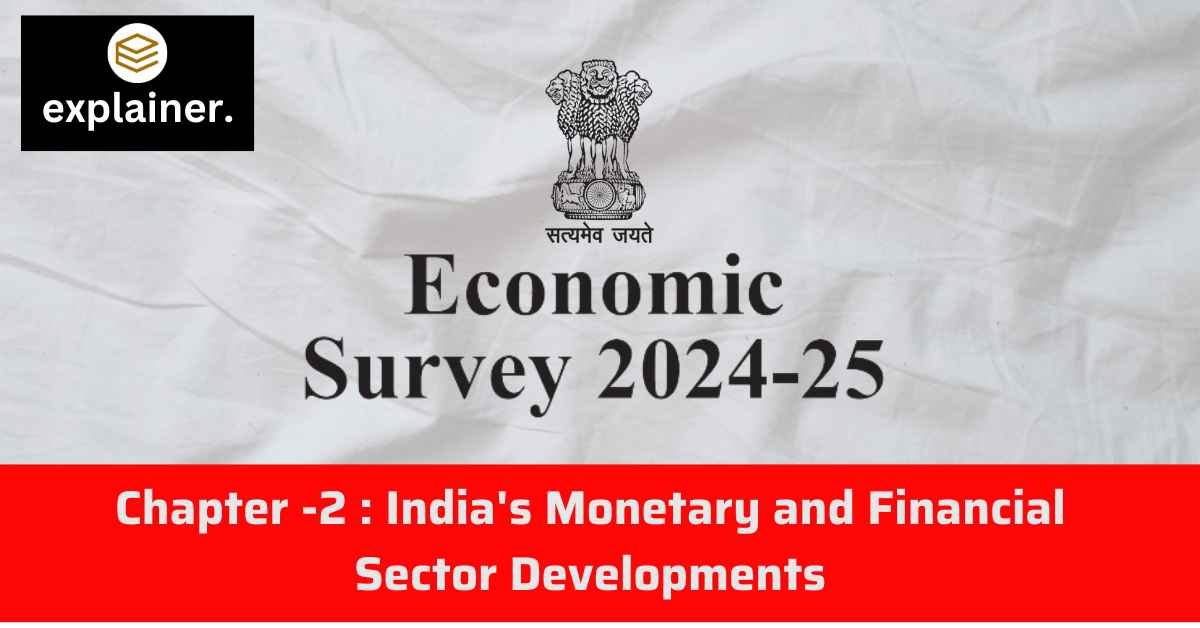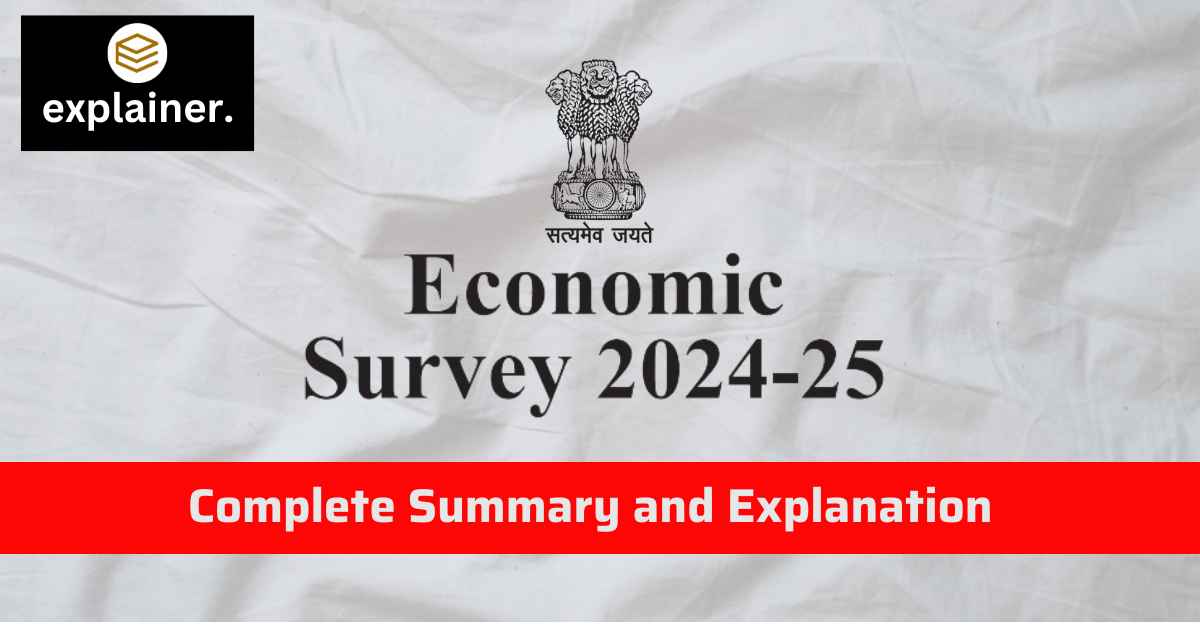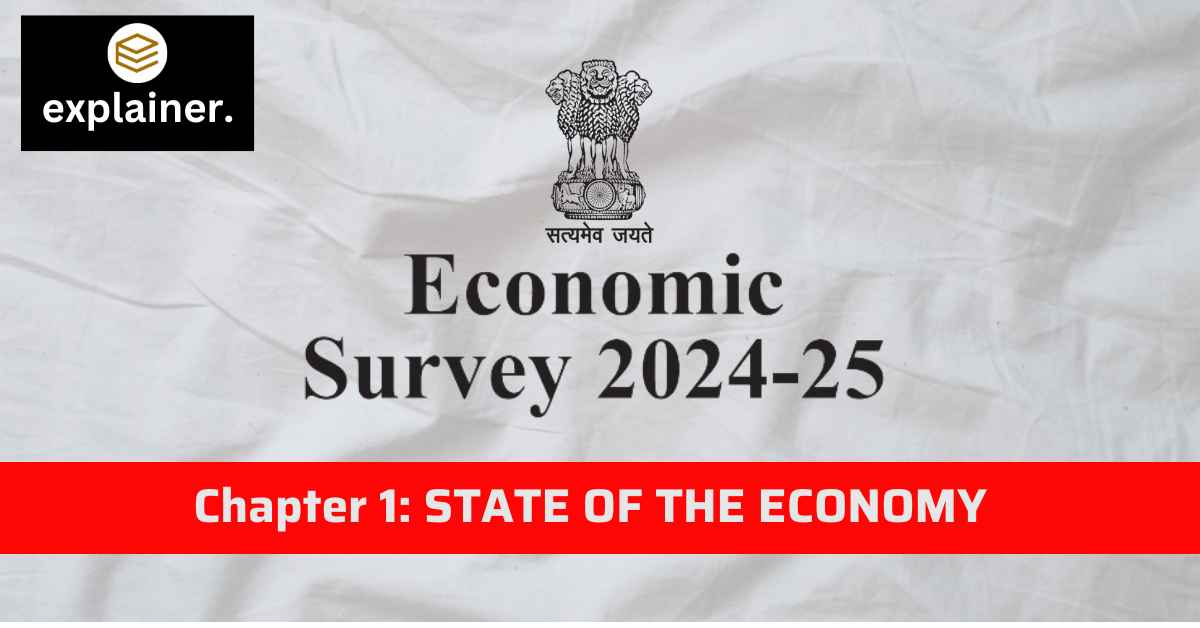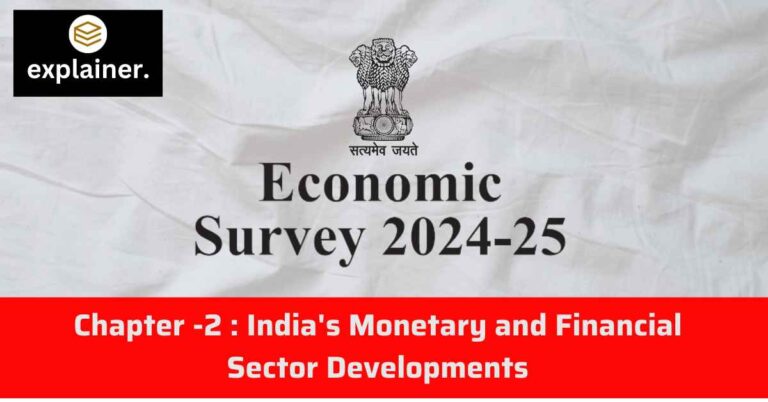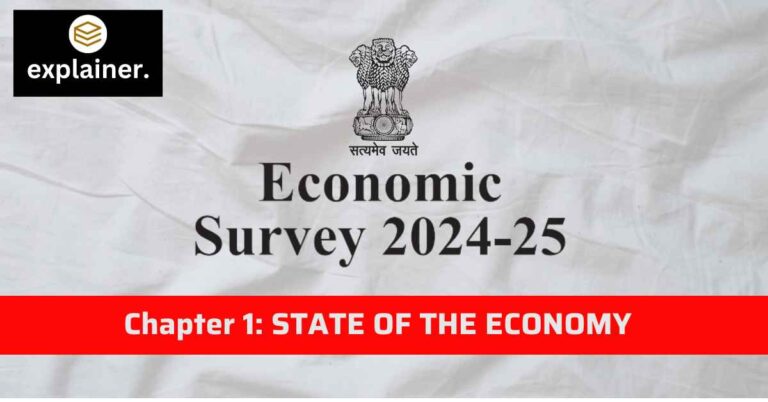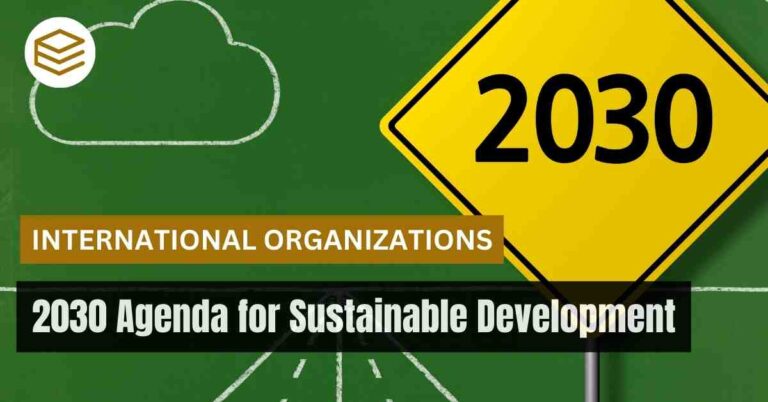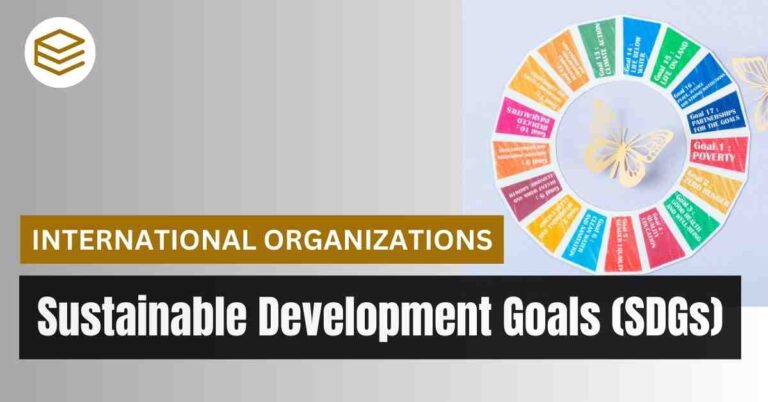January 25, 2026 3:40 am
The Economic Survey 2024-25 serves as a crucial document for understanding India’s economic landscape, providing a detailed analysis of macroeconomic trends, fiscal policies, sectoral performance, and policy recommendations. The report, published by the Ministry of Finance, Government of India, outlines key economic indicators, financial market developments, and India’s growth trajectory in the coming years.
Introduction to the Economic Survey 2024-25
The Economic Survey 2024-25 presents a structured evaluation of India’s economic performance and highlights major policy initiatives. It provides insights into global economic conditions, domestic fiscal strategies, and investment trends that shape India’s economic future. This year’s survey underscores the resilience of the Indian economy amidst geopolitical challenges, inflationary pressures, and structural reforms.

Global Economic Context in Economic Survey 2024-25
The Economic Survey 2024-25 identifies global economic headwinds, including:
- Persistent inflation in major economies.
- Geopolitical tensions affecting global trade.
- Impact of monetary policy shifts by major central banks.
Despite these challenges, India’s economy has demonstrated robust performance, with significant contributions from industrial growth, infrastructure expansion, and digital transformation.
India’s Economic Performance in Economic Survey 2024-25
The Economic Survey 2024-25 highlights India’s GDP growth, fiscal consolidation, and external sector performance. Key findings include:
- GDP Growth: India’s GDP growth rate for FY 2024-25 is projected at 6.5%, making it one of the fastest-growing economies globally.
- Fiscal Deficit: The fiscal deficit target is set at 5.9% of GDP, emphasizing fiscal prudence while sustaining growth.
- Inflation Trends: The survey notes a decline in inflationary pressures due to effective monetary policy interventions.
Sector-Wise Analysis in Economic Survey 2024-25
1. Agriculture and Rural Development
The Economic Survey 2024-25 underscores the importance of modernizing agriculture, with a focus on:
- Crop Diversification: Encouraging farmers to shift from water-intensive crops.
- Agri-Tech Innovations: Increased adoption of AI-driven precision farming.
- Irrigation Expansion: New irrigation projects to enhance agricultural productivity.
2. Industry and Manufacturing
Manufacturing has shown resilience in the Economic Survey 2024-25, with notable trends such as:
- PLI Scheme Success: Boosting domestic manufacturing and exports.
- Expansion in MSME Sector: Government incentives driving small business growth.
- Digital Transformation: Integration of AI and automation in industrial production.
3. Services Sector Growth
The services sector continues to be the backbone of India’s economy in the Economic Survey 2024-25. Key areas include:
- IT and Digital Services: Strong export performance in software and IT-enabled services.
- Tourism and Hospitality: Post-pandemic revival of the travel industry.
- Financial Services: Expansion of digital banking and fintech innovations.
4. Infrastructure and Investment
The Economic Survey 2024-25 highlights major infrastructure projects, including:
- Highway Expansion: Faster road connectivity across states.
- Smart Cities Mission: Development of urban centers with advanced technology integration.
- Renewable Energy Initiatives: Investment in solar and wind power to achieve sustainability goals.
Monetary and Fiscal Policy in Economic Survey 2024-25
The Economic Survey 2024-25 analyzes the Reserve Bank of India’s (RBI) monetary policy stance:
- Repo Rate Adjustments: RBI’s policy decisions to control inflation and spur growth.
- Liquidity Management: Strategies to maintain financial stability.
- Banking Sector Reforms: Enhanced credit availability and financial inclusion.
External Sector and Trade Performance in Economic Survey 2024-25
The Economic Survey 2024-25 discusses India’s trade performance, foreign direct investment (FDI), and global competitiveness:
- Export Growth: Surge in pharmaceutical, IT, and automobile exports.
- FDI Trends: Increased foreign investments in technology and manufacturing.
- Trade Deficit Management: Strategies to enhance export competitiveness and reduce import dependency.
Employment and Skill Development in Economic Survey 2024-25
Employment remains a critical focus in the Economic Survey 2024-25:
- Skill Development Programs: Expansion of vocational training initiatives.
- Gig Economy Growth: Rise of freelance and contract-based employment.
- Women’s Workforce Participation: Policies aimed at increasing female employment in diverse sectors.
Climate Change and Sustainability in Economic Survey 2024-25
The Economic Survey 2024-25 emphasizes India’s commitment to sustainable development:
- Carbon Neutrality Goals: Strategies to achieve net-zero emissions.
- Renewable Energy Investments: Expansion of green energy infrastructure.
- Climate Adaptation Measures: Strengthening disaster resilience in vulnerable regions.
Summaries of Chapters of Economic Survey:
Conclusion: The Road Ahead in Economic Survey 2024-25
The Economic Survey 2024-25 presents a roadmap for India’s sustained economic growth. Key takeaways include:
- Strengthening fiscal discipline while fostering economic expansion.
- Leveraging technology for inclusive growth.
- Enhancing global trade partnerships to boost exports.
- Prioritizing sustainable development and green energy solutions.
With a well-structured policy framework and strategic economic interventions, the Economic Survey 2024-25 sets the foundation for India’s vision of becoming a $5 trillion economy in the near future.

Useful Links
- Millennium Development Goals (MDGs): A Comprehensive Analysis
- Multidimensional Poverty Index (MPI) – Economy Notes for UPSC 2025
- Sustainable Development Goals (SDGs): Relevance in UPSC Mains and Prelims
- India’s Energy Security: Challenges and Opportunities
- India’s Urbanization: Challenges and Opportunities
- Water Security in India: Challenges and Solutions
- Agricultural Challenges and Opportunities in India
- India’s Infrastructure Development: Challenges and Opportunities
- Digital Transformation in India: Challenges and Opportunities
- Sustainable Development Goals (SDGs): A Comprehensive Analysis 2025
- 2030 Agenda for Sustainable Development: A Comprehensive Analysis
FAQs on Economic Survey
What is the Economic Survey?
The Economic Survey is an annual document published by the Ministry of Finance, Government of India, usually a day before the Union Budget. It provides a comprehensive analysis of India’s economic performance in the past financial year and outlines policy recommendations for the future.
Who prepares the Economic Survey?
The Economic Survey is prepared by the Department of Economic Affairs (DEA) under the Ministry of Finance, with inputs from various government departments. It is usually authored by the Chief Economic Adviser (CEA) of India.
What is the purpose of the Economic Survey?
The Economic Survey serves multiple purposes:
Informing investors, policymakers, and citizens about India’s economic outlook.
Analyzing macroeconomic trends in GDP growth, inflation, investment, trade, and employment.
Providing policy recommendations for future economic planning.
Assessing fiscal health and budgetary performance of the government.
Is the Economic Survey legally binding?
No, the Economic Survey is not legally binding. It serves as an advisory document for policymakers and offers recommendations but does not dictate government decisions.
When is the Economic Survey released?
The Economic Survey is typically released a day before the Union Budget in January or February.
What are the key themes covered in the Economic Survey?
The Economic Survey covers:
- Macroeconomic Overview – GDP growth, inflation, trade, fiscal health.
- Sectoral Performance – Agriculture, industry, services, infrastructure.
- Investment & Public Finance – Government expenditure, tax revenue, fiscal deficit.
- Employment & Labor Market Trends.
- External Sector Analysis – Trade balance, foreign exchange reserves, remittances.
- Structural Reforms & Future Outlook.
How is the Economic Survey structured?
The Economic Survey is divided into two volumes:
- Volume 1: Analytical and forward-looking, focusing on policy recommendations and economic theory.
- Volume 2: Data-driven, presenting statistical trends and factual analysis of India’s economic performance.
Why is the Economic Survey important?
The Economic Survey is significant because:
- It provides credible, research-backed insights into India’s economy.
- It helps the government frame policies for sustainable growth.
- It guides investors, researchers, and academicians with economic data.
- It acts as a basis for budgetary decisions and long-term economic planning.
How does the Economic Survey impact the Union Budget?
The Economic Survey provides key insights and recommendations that help shape the government’s budgetary policies. It influences:
- Fiscal deficit targets and taxation policies.
- Infrastructure investment plans.
- Social welfare schemes and economic reforms.
How is the Economic Survey different from the Union Budget?
Difference Between Govt. Budget and Economic Survey
| Feature | Economic Survey | Union Budget |
|---|---|---|
| Purpose | Analyzes past economic performance and gives future policy recommendations | Allocates financial resources for government spending and revenue collection |
| Legal Status | Advisory in nature | Legally binding |
| Prepared by | Ministry of Finance (Chief Economic Adviser’s office) | Ministry of Finance (Finance Minister’s office) |
| Release Date | A day before the Union Budget | February 1st each year |
| Scope | Analytical and theoretical | Practical and financial |
Who uses the Economic Survey?
The Economic Survey is used by:
- Government policymakers for economic planning.
- Economists and researchers for macroeconomic analysis.
- Investors and businesses for financial decision-making.
- Students and UPSC aspirants preparing for competitive exams.
What are some key highlights of past Economic Surveys?
Some key highlights of past Economic Surveys:
- 2023-24 Economic Survey: Focused on post-pandemic recovery, fiscal consolidation, and investment-led growth.
- 2022-23 Economic Survey: Highlighted Atmanirbhar Bharat, Make in India, and digital economy growth.
- 2019-20 Economic Survey: Introduced Thalinomics (affordability of food in India) and wealth creation models.
How can I access the full Economic Survey?
The Economic Survey can be accessed on:
- Ministry of Finance website: www.indiabudget.gov.in
- Press Information Bureau (PIB) releases.
- Government publications and reports.
Is the Economic Survey useful for UPSC preparation?
Yes! The Economic Survey is highly relevant for UPSC aspirants, especially for:
- General Studies Paper 3 (Economy, Infrastructure, Growth & Development).
- Essay Paper (topics on economic policies and trends).
- Interview Preparation, as it provides recent economic developments and policy recommendations.




